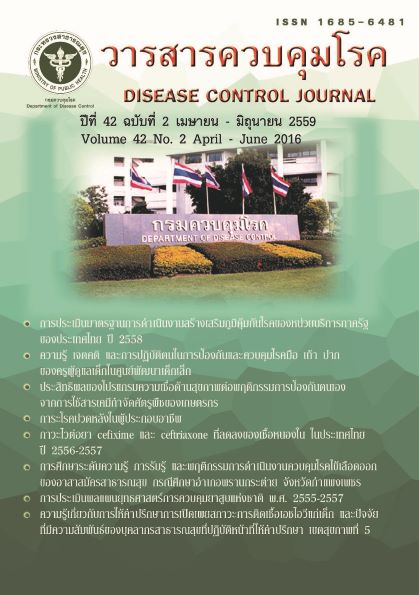The effectiveness of health belief program on pesticide prevention behavior among the farmers
DOI:
https://doi.org/10.14456/dcj.2016.21Keywords:
health belief model, prevention behavior, attitudes, pesticide, farmersAbstract
This research was an experimental study to examine the effectiveness of health belief program on pesticide prevention behavior among the farmers. Samples were 61 famers in Moo 10 Nongbua subdistrict, Kosumphisai district, Mahasarakham province. Thirty one famers participated in the experimental group and 30 in control group. The experimental group joined the health belief program. Data were collected by using questionnaire on perception of health belief in farmer and questionnaire on pesticide prevention behaviors in farmer. The data were analyzed by descriptive statistics, Wilcoxon testand Mann-Whitney U test. The result before implementation, there was no difference of the perception of health belief between experimental group and control group but pesticide prevention behaviors was significantly difference. After the experimentation, the experimental group had mean scores regarding the perception of health belief and pesticide prevention behaviors significantly higher than that before program (p<0.01). The experimental group had mean score of the perception of health belief and pesticide prevention behaviors significantly higher than that of the control group (p<0.01). This study shows that the health belief program on pesticide prevention behavior among the farmer are productive. Increasing the level of perceived health belief and pesticide prevention behaviour.
Downloads
References
2. ตั้ม บุญรอด, วิชชาดา สิมลา. พฤติกรรมการใช้สารกำจัดศัตรูพืชของเกษตรกรในตำบลแหลมโตนด อำเภอควนขนุน จังหวัดพัทลุง. วารสารมหาวิทยาลัยทักษิณ 2554;14:66-75.
3. กฤติญา แสงภักดี, กัญจน์ ศิลปะสิทธิ์, ดวงรัตน์ แพงไทย, วสินี ไขว้พันธ์, ศิรินภา ศิริยันต์, ภัทรพงษ์ เกริกสกุล. การศึกษาพฤติกรรมการใช้สารเคมีในการกำจัดศัตรูพืชของชาวนา อำเภอองครักษ์ จังหวัดนครนายก. แก่นเกษตร 2557;42:375-84.
4. Strecher V, Rosenstock I. The health belief model. In: A. Baum, editors. Cambridge hand¬book of psychology, health and medicine. New York, NY: Cambridge University; 1997. p. 113-7.
5. อรุณ จิรวัฒน์กุล. สถิติทางวิทยาศาสตร์สุขภาพเพื่อการวิจัย. พิมพ์ครั้งที่ 2. กรุงเทพมหานคร: วิทยพัฒน์; 2553.
6. สุจิตรา ยอดจันทร์, จรรจา สันตยากร, ณรงค์ศักดิ์ หนูสอน, ปกรณ์ ประจัญบาน. ผลของโปรแกรมความเชื่อด้านสุขภาพต่อพฤติกรรมการป้องกันตนเองจากการใช้สารเคมีกำจัดศัตรูพืชของชาวนา. วารสารการพยาบาลและสุขภาพ 2554;5:45-54.
7. หลักชัย หล่อประโคน, ชัยยง ขามรัตน์, สอาด วีระเจริญ. ผลของการประยุกต์ใช้แบบแผนความเชื่อด้านสุขภาพกับการเรียนรู้แบบมีส่วนร่วม เพื่อปรับเปลี่ยนพฤติกรรมการทำงานที่ปลอดภัยของคนงานทำผลิตภัณฑ์ล้อเกวียน ตำบลไพศาล อำเภอประโคนชัย จังหวัดบุรีรัมย์. วารสารวิจัยและพัฒนาระบบสุขภาพ. 2557; 6:96-104.
8. พิริพัฒน์ ธรรมแงะ. พฤติกรรมการป้องกันอันตรายจากการใช้สารเคมีกำจัดศัตรูพืชของเกษตรกรชนเผ่าปกาเกอะญอ บ้านแม่สายนาเลา ตำบลโหล่งขอด อำเภอพร้าว จังหวัดเชียงใหม่ [การค้นคว้าอิสระ ปริญญาสาธารณสุขศาสตรมหาบัณฑิต]. เชียงใหม่:มหาวิทยาลัยเชียงใหม่; 2550.
9. วิชุดา สิมลา, ตั้ม บุญรอด. ปัจจัยที่มีความสัมพันธ์กับพฤติกรรมการป้องกันสารเคมีกำจัดศัตรูพืชของเกษตรกร ตำบลแหลมโตนด อำเภอควนขนุน จังหวัดพัทลุง. วารสารสาธารณสุขศาสตร์ 2555;42:103- 13.
10. วาสนา เกตุมะ, ประนอม โอทกานนท์, จันทกานต์ กาญจนเวทางค์, จิราวุธ พันธชาติ. ผลของการประยุกต์แบบแผนความเชื่อด้านสุขภาพต่อพฤติกรรมการ ตรวจเต้านมด้วยตนเองในสตรีวัยเจริญพันธุ์. วารสารการพยาบาลและสุขภาพ 2552;3:132-43.
11. ศิริพร สมบูรณ์, ทัศนีย์ รวิวรกุล, สุรินธร กลัมพากร, วันเพ็ญ แก้วปาน. ผลของการประยุกต์แบบแผนความเชื่อด้านสุขภาพ ร่วมกับการมีส่วนร่วมของชุมชนต่อพฤติกรรมการป้องกันอันตรายจากการใช้สารเคมีกำจัดศัตรูพืชในเกษตรกร อำเภอองครักษ์ จังหวัดนครนายก. วารสารพยาบาลสาธารณสุข 2553;24: 62-77.
12. ภาพร อ่อนเงิน. การประยุกต์ใช้ทฤษฎีแบบแผนความเชื่อด้านสุขภาพเพื่อป้องกันอันตรายจากการใช้สารเคมีกำจัดศัตรูพืชของเกษตรกรที่ปลูกข้าวโพด ตำบลบ้านใหม่ อำเภอบ้านแพรก จังหวัดพระนครศรีอยุธยา [วิทยานิพนธ์ปริญญาสาธารณสุขศาสตร มหาบัณฑิต]. มหาสารคาม: มหาวิทยาลัยมหาสารคาม; 2553.
Downloads
Published
How to Cite
Issue
Section
License
Articles published in the Disease Control Journal are considered as academic work, research or analysis of the personal opinion of the authors, not the opinion of the Thailand Department of Disease Control or editorial team. The authors must be responsible for their articles.






